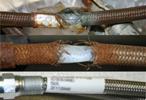
CSB Seeks Comments on DuPont Belle Draft Report
The agency investigated three releases at the West Virginia plant within a 48-hour period in January 2010, including a phosgene gas release that killed a worker who was near the location where phosgene cylinders were stored.
The U.S. Chemical Safety Board has opened a public review and asked for comments on its draft investigation report about three releases in January 2010 at DuPont's Belle, West Virginia plant, all within 48 hours. One was a phosgene gas release that killed a worker near the location where phosgene cylinders were stored.
CSB recommended that OSHA update its compressed gas safety standard to include secondary enclosures for toxic gases such as phosgene.
CSB posted the report July 7 on its website and is making it available for review and comment until 5 p.m. Aug. 22. Comments should be e-mailed to [email protected] following directions for submitting comments that are provided on the site. Written comments also may be provided by mail to: Ms. Amy McCormick, Board Affairs Specialist, DuPont Draft Investigation Report Comments, U.S. Chemical Safety Board, 2175 K St. NW, Washington, DC 20037.
The three incidents were releases of 2,000 pounds of methyl chloride that occurred unnoticed over a five-day period, and then releases of oleum and phosgene. "Key issues involved in the three investigations include safe process design, mechanical integrity, alarm management, operating procedures, and company emergency response and notification procedures," CSB said in its notice announcing the public review.
CSB board member and former chairman John Bresland said July 7, "These kinds of findings would cause us great concern in any chemical plant, but particularly in DuPont with its historically strong work and safety culture. In light of this, I would hope that DuPont officials are examining the safety culture company-wide." He noted that CSB found the phosgene hose that burst in front of a worker was supposed to be changed out at least once per month. But the hose that failed, shown in a CSB photo, had been in service for seven months and was susceptible to corrosion from phosgene. Team Lead Johnnie Banks said, "Documents obtained during the CSB investigation showed that as far back as 1987, DuPont officials realized the hazards of using the braided stainless steel hoses lined with Teflon, or PTFE. An expert employed at DuPont recommended the use of hoses lined with Monel, a strong metal alloy used in highly corrosive conditions. The DuPont official stated, 'Admittedly, the Monel hose will cost more than its stainless counterpart. However, with proper construction and design so that stresses are minimized . . . useful life should be much greater than 3 months. Costs will be less in the long run and safety will also be improved.' " The Monel hose was never used, according to CSB.
Once the comment period closes, the draft report may be modified based on comments received and other CSB staff investigative activities. A final report will be presented to the board for its consideration and a final vote.